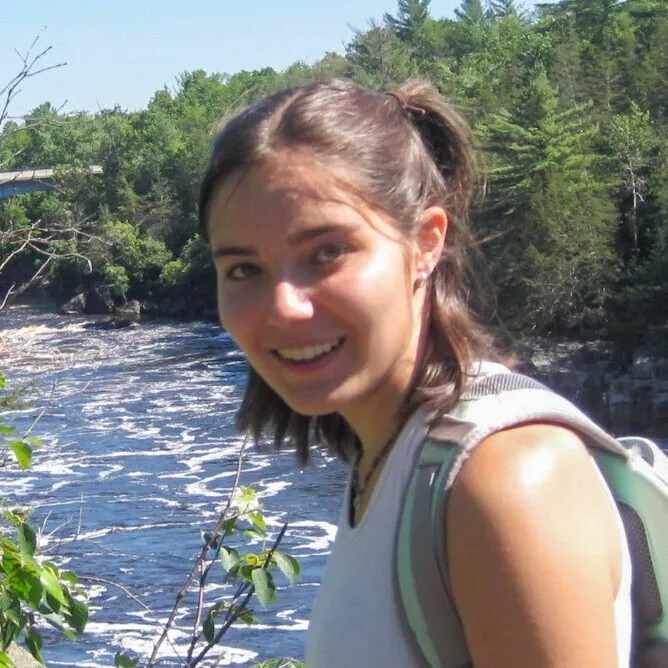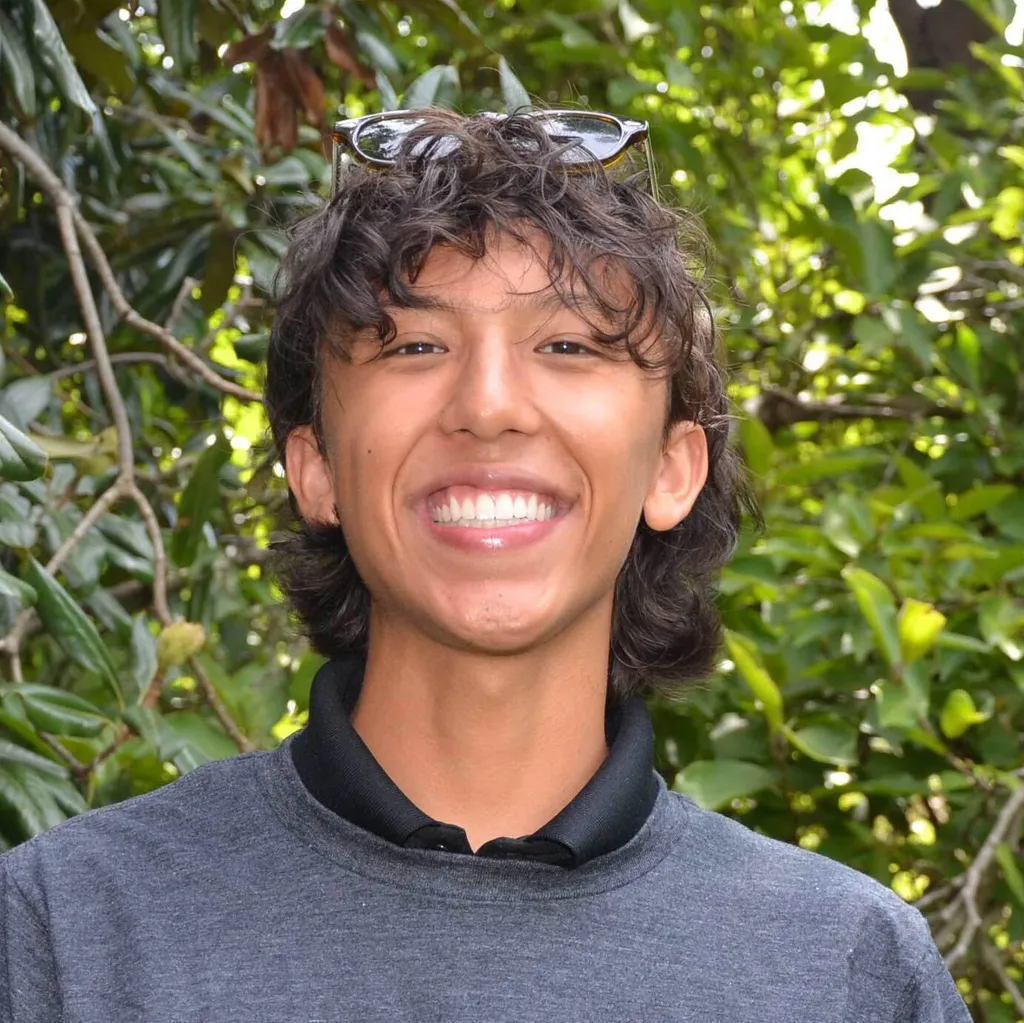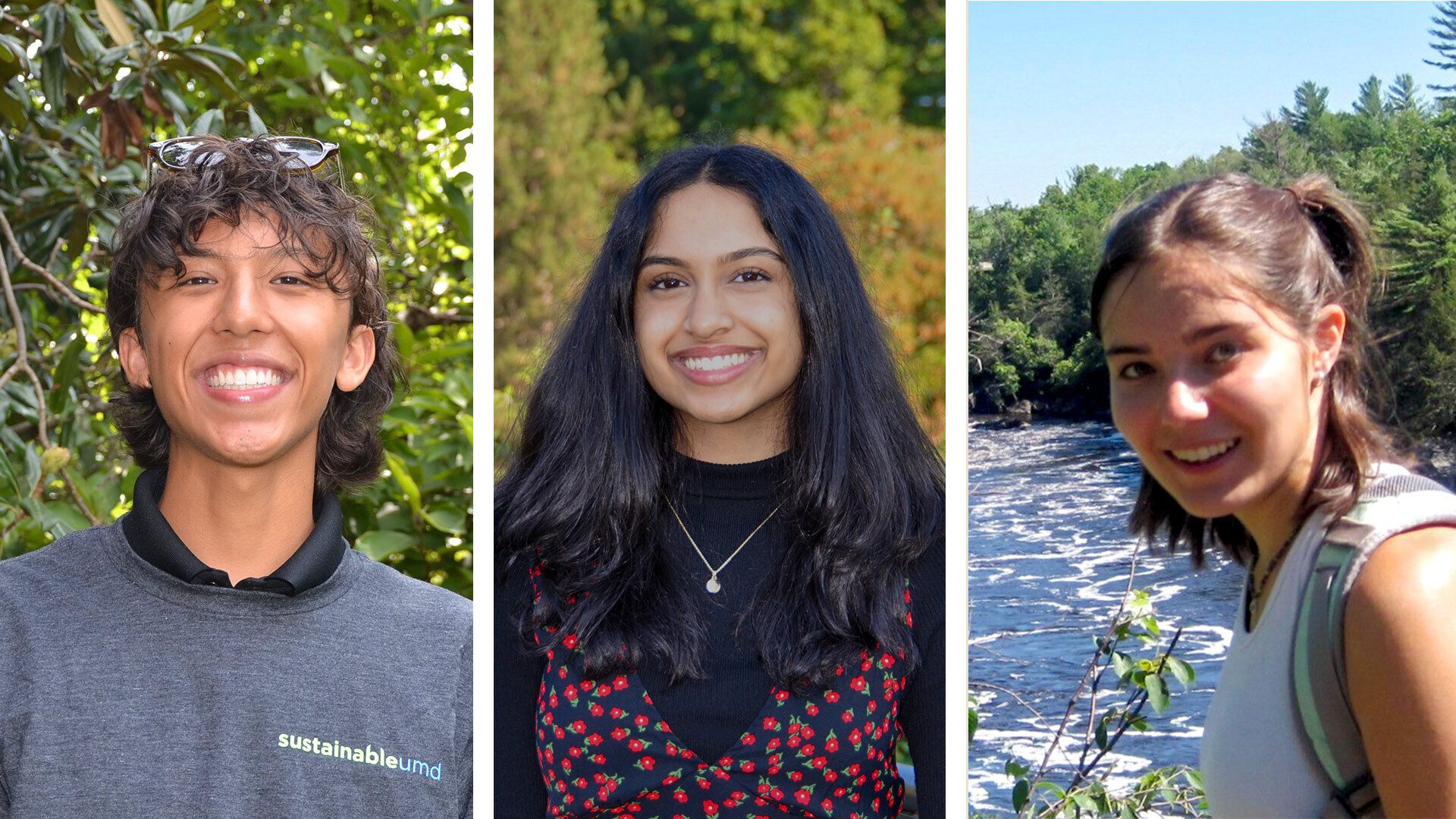- May 07, 2025
- By Georgia Jiang, Sophia Yodice ’27 and Brittany Proudfoot Ginder
Three University of Maryland sophomores are recipients of 2025 National Oceanic and Atmospheric Administration (NOAA) Ernest F. Hollings Scholarships, one of the nation’s highest honors for exceptional students in STEM fields.
The scholarships provide up to $19,000 in financial support, professional development opportunities and a paid summer internship at any NOAA facility across the U.S. With this year’s recipients, UMD’s total number of Hollings Scholars since 2008 rises to 49.

Bhavika Buddi, a computer science major, saw while growing up how extreme weather events transformed her home state of Oregon. Year after year, wildfires grew more intense and heat waves more severe, threatening the forests and coastlines where she spent her childhood hiking, biking and exploring.
Buddi turned this connection with nature into research at the intersection of computer science and environmental science that could help communities adapt to changing climate.
“I hope that my experience at NOAA will help me further develop my interdisciplinary skills to directly address the challenges of extreme environmental events,” Buddi said. “I really want to use technology as a tool to help people prepare for and adapt to these increasingly severe phenomena.”
Under the mentorship of Assistant Research Professor Kathleen Kennedy at UMD’s Center for Global Sustainability, Buddi applied data analysis techniques to address real-world environmental policy issues.
“I conducted detailed data analysis to get a comprehensive picture of small businesses in Maryland and classified each business based on how the renewable energy transition might affect them,” Buddi explained. The research culminated in a report that the team presented directly to Maryland state officials and legislative stakeholders.
Buddi’s experience applying data science to environmental policy proved transformative. She hopes the Hollings Scholarship will allow her to continue doing similar research, ideally at a NOAA unit like the Office of Atmospheric and Oceanic Research, which enables better, more accurate forecasts and earlier warnings for natural disasters.
“I’d like to learn how to utilize AI and machine learning for computational modeling,” Buddi added. “I see these tools as ways to analyze and predict vast quantities of data better and faster, which is essential when it comes to dealing with climate-related disasters.”
She sees her upcoming internship as an opportunity to learn from the country’s best meteorologists and atmospheric scientists, putting her at the forefront of natural disaster prediction and emergency response research.
“My overall goal is to work in disaster recovery, response and preparedness,” Buddi said. “I’d like to work in modeling and better understand these environmental changes so that I’ll be able to better communicate the science to the people who are most impacted by the climate crisis.”

Natalie Rosenthal, an environmental science and policy major with a wildlife ecology concentration, is committed to environmental sustainability on UMD’s campus and across the state—a journey that began last year when she interned in the university’s Global Ecology Lab.
There, she worked on the lab’s Campus Forest Carbon Project and learned about its ecosystem demography model, a cutting-edge vegetation ecosystem model used by the lab and NASA’s Carbon Monitoring System, led by geographical sciences Professor George Hurtt.
Rosenthal wrote a successful grant proposal to the University of Maryland Sustainability Fund for the Campus Forest Carbon Project 2.0, an initiative to monitor the annual carbon flux of Maryland's forested lands, inform campus sustainability policies, support tree planting efforts and foster inter-university collaboration. The funding was matched by the Department of Geographical Sciences.
“Forest carbon monitoring is important because it emphasizes the value of trees as they provide vital ecosystem services to the environment around them as well as to humans, including their ability to sequester carbon,” said Rosenthal, the project’s principal investigator. “By being able to provide data on the carbon sequestration of these forested areas, we are able to show the benefits of having tree coverage on campus and show the university possible areas that can increase tree plantings.”
The project strengthened her technical skills in remote sensing, and in her NOAA internship, Rosenthal hopes to help monitor natural disasters and engage in fieldwork related to rising temperatures in the ocean within NOAA’s National Environmental Satellite, Data, and Information Service in the Department of Commerce.
Rosenthal is also a member of the Environment of Technology and Economy College Park Scholars program, a role that enables her to be a mentor to freshmen. She looks forward to working with students involved in remote sensing and urges other environmental policy students to get involved on campus and engage with peers in and outside their field of work.
“I think putting myself in rooms with people who are way more experienced, way smarter than I am who have just all of these amazing skills to offer has been so beneficial because I've learned so much from them, and I've seen how much I've grown in just the last two years,” Rosenthal said.

Gabriel “Gabe” Santiago, an environmental science and policy major, approaches academics with curiosity and interdisciplinarity and is dedicated to bridging the gaps between environmental policy activities and important scientific realities.
During an internship with the Maryland General Assembly as an Energy and Environmental Policy Federal Fellow, he realized public and environmental policymakers—at the state and federal levels—could benefit from deeper engagement with the science behind the policies they create.
His application for the Hollings Scholarship is meant to be a step toward closing this divide, he said.
“As someone passionate about innovative solutions to climate change adaptation and mitigation, I’m excited about the opportunity to contribute to this mission through NOAA’s work over the next two years,” Santiago said.
His main environmental research interests are coastal resilience—including sea level rise, storms, flooding and erosion—as well as an integrated policy response perspective in matters relating to climate. He plans to pursue these interests within NOAA's National Ocean Services branch.
In University Honors, he explored the relationship between pop culture, musicology and climate change, and has written for UMD’s Interpolations: Journal of Academic Writing about the nuanced discourse of cultural borrowing in the fashion world. He was also awarded a gold medal in the Scholastic Art and Writing Awards and is a recipient of a Herb Block Scholarship.
“Through University Honors, I’ve learned to approach complex issues from multiple angles and to value interdisciplinary thinking,” Santiago said. “These skills are essential to the mission of the Hollings Scholarship, which lies at the intersection of science and research, communication and public service.”
